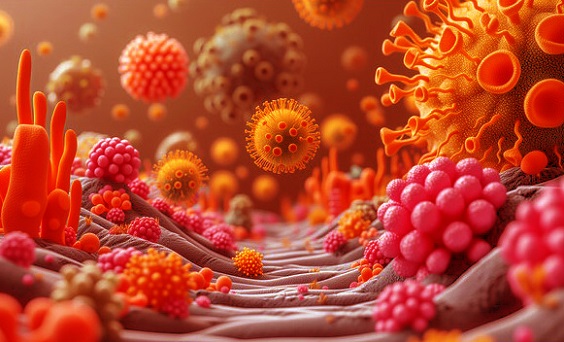Nikhil Prasad Fact checked by:Thailand Medical News Team Dec 20, 2024 3 months, 3 weeks, 5 days, 4 hours, 3 minutes ago
Medical News: A groundbreaking study has shed light on the fascinating connection between the gut microbiome and prolonged SARS-CoV-2 PCR positivity. Researchers from several esteemed institutions in Spain, including the Institute of Food Science Research (CIAL), the Dairy Research Institute of Asturias, the Severo Ochoa Molecular Biology Center, and the Institute of Parasitology and Biomedicine “Lopez-Neyra,” have collaborated to uncover how gut health might influence COVID-19 recovery outcomes. This
Medical News report delves into the study, its methods, findings, and implications, offering a comprehensive understanding for everyone.
 Gut Microbiome and Prolonged COVID-19 PCR Positivity
Background of the Study
Gut Microbiome and Prolonged COVID-19 PCR Positivity
Background of the Study
COVID-19, caused by the SARS-CoV-2 virus, has transformed lives worldwide. While most people recover from the infection within a few weeks, some individuals remain PCR-positive for over 30 days, raising concerns about viral persistence. Persistent positivity, distinct from active infection, may involve viral fragments lingering in the body. To investigate this, researchers turned their attention to the gut microbiome, an intricate ecosystem within our digestive system known to influence immunity and overall health.
The researchers hypothesized that differences in gut microbiome composition and functionality could correlate with the duration of PCR positivity. They aimed to determine whether the gut microbiome plays a role in prolonged viral clearance and identify potential host factors influencing these outcomes.
Study Design and Methods
Conducted between January 2021 and January 2022, the study analyzed fecal and blood samples from 28 participants diagnosed with COVID-19. Participants were divided into two groups:
-The control group, comprising individuals who cleared the virus within 30 days.
-The PCR+ group, including those who remained PCR-positive beyond 30 days.
The research incorporated shotgun metagenomics, a powerful technique for analyzing microbial DNA, to evaluate microbiome composition and function. Additionally, blood markers, dietary habits, and clinical parameters were scrutinized for their role in delayed viral clearance. The study ensured rigorous ethical oversight and compliance with international research standards.
Key Findings
-Microbial Composition Differences
One of the study’s major revelations was the significant variation in gut microbiota between the two groups. Individuals in the PCR+ group exhibited higher proportions of certain bacterial families, such as Akkermansiaceae and Synergistaceae, alongside a notable increase in pathogenic taxa like Eisenbergiella and Cloacibacillus. These taxa have been associated with inflammation and metabolic disturbances.
In contrast, the control group’s gut microbiome was enriched with beneficial bacteria such as Roseburia and Slackia, known for their anti-inflammatory p
roperties. This microbial diversity and balance appeared to support faster viral clearance.
-Functional Metabolic Pathways
The researchers uncovered notable functional differences in the microbiomes of the two groups. Persistent PCR positivity was linked to an increased abundance of gene pathways involved in amino acid and nucleotide biosynthesis. These pathways suggest an overactive microbial environment, potentially indicative of a dysbiotic state.
Interestingly, short-chain fatty acids (SCFAs), vital for maintaining gut health, were found in lower concentrations in the PCR+ group. SCFAs like butyrate and propionate play crucial roles in reducing inflammation and supporting immune function. Their depletion could hinder the recovery process.
Host Factors and Diet
This study emphasized the interplay between diet and gut health. Participants in the PCR+ group reported higher consumption of processed foods, sugary beverages, and red meat. Conversely, individuals with healthier dietary patterns, including higher intakes of plant-based foods and omega-3 fatty acids, demonstrated faster viral clearance.
Notably, blood markers like elevated levels of basophils, segmented neutrophils, and liver enzymes (e.g., ALT and gamma-GT) were prevalent in the PCR+ group. These markers suggest an ongoing inflammatory response and possible liver involvement in delayed recovery.
Broader Implications
The findings underscore the gut’s integral role in immune regulation and COVID-19 recovery. Persistent positive PCR results could reflect deeper issues within the gut microbiome, potentially exacerbated by poor dietary choices and underlying inflammation. The study highlights the need to incorporate microbiome health into long-term recovery strategies for COVID-19.
Conclusions
In summary, this study has advanced our understanding of the gut microbiome’s influence on COVID-19 outcomes. By identifying microbial and host factors associated with prolonged PCR positivity, the research opens avenues for tailored nutritional and microbiome-targeted interventions. Supporting gut health through diet and probiotics might emerge as a valuable strategy for enhancing recovery.
These findings not only emphasize the importance of a balanced diet in maintaining microbiome equilibrium but also point to the potential of integrating microbiome monitoring into clinical practice for managing post-COVID-19 conditions. Future research should explore larger cohorts and delve deeper into the mechanisms linking gut microbiota and SARS-CoV-2 persistence.
The study findings were published in the peer-reviewed journal: Frontiers in Cellular and Infection Microbiology.
https://www.frontiersin.org/journals/cellular-and-infection-microbiology/articles/10.3389/fcimb.2024.1494193/full
For the latest COVID-19 News, keep on logging to Thailand
Medical News.
Read Also:
https://www.thailandmedical.news/news/link-between-infant-respiratory-microbiome-and-respiratory-syncytial-virus-rsv-severity-uncovered
https://www.thailandmedical.news/news/covid-19-causes-changes-to-ocular-microbiome-which-can-affect-eye-health
https://www.thailandmedical.news/news/cancer-news-australian-scientists-discover-that-tcf-1-from-gut-microbiome-prevents-gamma-delta-t-cells-in-gut-from-fighting-off-colorectal-cancer
